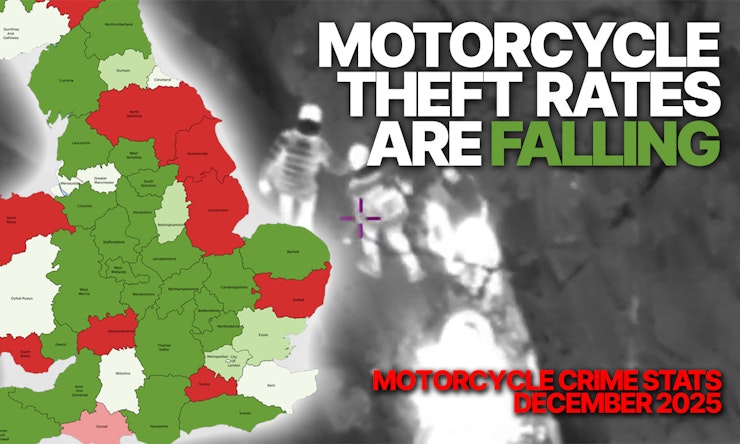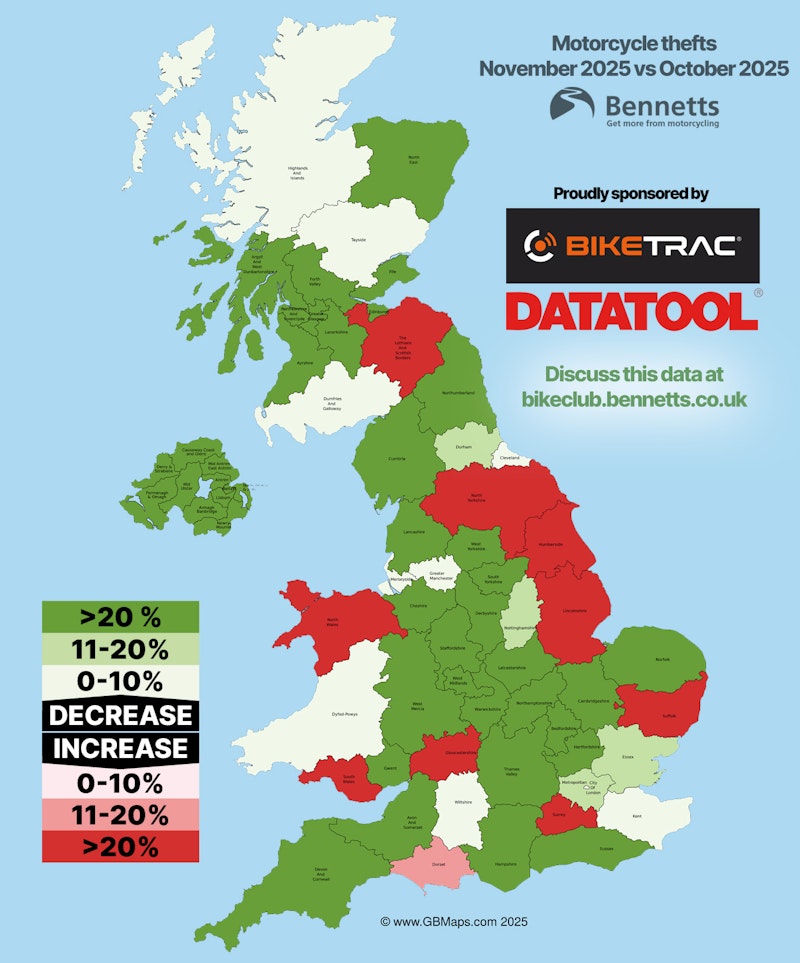UK motorcycle theft report DECEMBER: Crime trends & arrest stories
By John Milbank
Consumer Editor of Bennetts BikeSocial
08.12.2025
Seeing how criminal gangs move their operations around the UK can help motorcyclists realise the importance of locking their bikes, and be more prepared when thefts rise in their area.
This map shows the increases and decreases of motorcycle and scooter thefts by comparing the last full month’s data with the month before that. Remember – this is a MONTHLY overview.
Open the tab below the map to show the data in full, as the colours represent the CHANGE to theft rates reported by each Police force, not the quantity.
This month's theft stats explained
Data from the Police National Computer shows that Powered Two Wheeler (PTW) thefts were down across a large proportion of the UK in November compared to October.
This will of course be due in some part to the change in weather seeing fewer bikes out on the road, but criminals don’t stop for winter and high-value car-crime, thefts from and of vans, and the increasing use of e-bikes in enabled crime will likely have an impact on the number of motorcycle and scooters being stolen.
In fact, at November’s Motorcycle Crime Reduction Group meeting involving senior Police officers, the motorcycle industry and Bennetts BikeSocial, it was shown that motorcycle and scooter thefts were down 9.4% compared to the rolling year before, a trend that has continued since 2022.
Theft figures show that PTW thefts have consistently been BELOW those of 2022, 2023 and 2024 in every month except July 2025, where they crept up just above those of July 2024, but remained below 2022 and 2023.
PTW theft is dropping, and the trend looks to be continuing.
Despite negativity on social media, Police forces across the UK are doing all they can to reduce theft, and even the hardest-hit area – the Metropolitan Police Force – empowered a 7.1% drop in thefts in the rolling year of October 2025 compared to 2024.
Obviously crime is – and always has been – an issue that we all need to take seriously, and Bennetts BikeSocial continues to strongly recommend you use additional security on your motorcycle. But as our data shows that even basic devices can reduce the chances of your bike being stolen by a factor of three (and heavy-duty kit can make it less likely to be stolen than a car), it’s worth investing in the best security you can afford, using it, then stopping worrying and getting on with enjoying your bike. Find the best motorcycle security in our independent reviews here.
Remember: Police forces across the UK have limited resource and unlimited demand, so while they might not send someone out to look at the scene of a stolen bike (even fingerprinting can be useless in court in many cases), the data gathered from the report can – and does – lead to convictions, as we showed in this article.
If you want to discuss these figures, please join us at bikeclub.bennetts.co.uk
Our map shows where PTW thefts have increased and decreased, which can give an indication of where criminals gangs are moving their focus around the country. This is particularly important in more rural areas, where some riders could be caught by surprise if there’s a sudden bad patch.
It’s great to see that Avon and Somerset Police have reported a reduction in motorcycle thefts after the spike last month, with a 42% reduction from 123 to 72. Fife topped the chart for November, though that’s a drop from three to zero. It should also be noted that Dumfries and Galloway, Northern Scotland and City of London are highlighted on the map with pale green due to no change, but they’re all still showing no thefts at all. A great result.
Lothian & Borders is at the bottom of the table, so while motorcycle and scooter thefts are a relatively low 24 in total, that’s still a 243% increase from seven in October: potentially a sign that criminals are focussing on this area. Suffolk also saw a big spike, going from five to 14 thefts.
Overall the picture is a good one – PTW thefts continue to decline, and if we all make the effort to secure our bikes as best we can, while we’ll never stop crime altogether we can certainly make a big impact on it by encouraging thieves to move onto more easy pickings.
Let’s face it – electronically accessing then driving away in a car worth £60,000 is a lot more tempting than noisily attacking the lock on a motorcycle worth £12,000, then having to push it away…
Total PTW thefts November 2025: 1,468 (down 389 from October)
Top story: Nine stolen bikes recovered
West Yorkshire Police: Temple Newsam and Halton Neighbourhood Policing Team (NPT) continue to disrupt organised criminality, retail crime and road safety matters across the ward, working alongside operational support departments including the Leeds District Off-Road Bike Team, Operation Reset, partner agencies and third sectors.
Officers have conducted proactive operations, misuse of drugs warrants, high visibility hot-spot and enforcement patrols, and engagements across the ward to address the police, public and retail local priorities in the ward.
NPT officers alongside, Leeds District officers and operational support departments have executed several warrants in recent months, as part of Operation Doleedge, which has resulted in the following:
Significant quantities of Class A and B Drugs seized
Significant amounts of cash seized
Stolen goods recovered
Vehicle seizures
Arrests
Premise Closure Orders
As a result of the actions taken three individuals have been charged for Possession with intent to supply drugs and investigations are ongoing, to locate and arrest an outstanding suspect.
The Leeds District Off-Road Bike Team continue to disrupt the anti-social and criminal use of motorcycles across the ward, detecting offences and recovering stolen motorcycles. Their dedicated approach and deployments over the last two months has resulted in:
Five stolen motorcycles recovered
One stolen scooter recovered
One 4x4 vehicle seized
One individual arrested for Theft of motor vehicle
On Wednesday 12th November the Leeds District Off-Road Bike Team, Neighbourhood Policing officers and Operation Reset officers deployed in the ward to conduct arrest enquiries. The focused deployments resulted in:
Three stolen motorcycles recovered
Three individuals arrested
Drugs and cash seized
Motorcycle keys and helmets seized
Tools seized believed to be used in the commission of offences
Sergeant Bell, Lead for the Temple Newsam and Halton ward area said, “Protecting our communities is a priority and West Yorkshire Police and partners continue to tackle criminality and anti-social behaviour within local communities and will utilise all powers available to disrupt illegal activities, prevent offending and reassure the public.
“We are sending out a clear and strong message that law enforcement will not tolerate criminality that causes negative harm to communities, and hope that this acts as a deterrent for anyone considering being involved in criminal activities and anti-social behaviour.
“I would like to take this opportunity to thank all operational support units, and partner agencies involved in the recent successful deployments and operations held across the ward, to help keep communities safe and feeling safe.
“If you have any information or concerns about organised crime activity, retail crime or anti-social behaviour please contact West Yorkshire Police. Alternatively, information can be provided anonymously to the independent charity Crimestoppers on 0800 555 111.”
More motorcycle crime news
Motorcycle crime news you might have missed
Our data shows that using even a basic disc lock can reduce the chances of your motorcycle being stolen by a factor of three, and using heavy-duty security at home can make it less likely to be stolen than the average car.
High-value car crime has the attention of thieves, but while the odds are that you WON'T have your bike stolen, crime has and always will be a sad part of life. By taking some simple extra steps to secure your motorbike, you can make yourself far less likely to fall victim. Check out our regularly updated and totally unbiased guide to the best motorcycle locks here.
You’ll find the previous months’ maps at the bottom of this page, which will help to see how the gangs move around. The figures are obtained from the Police National Computer, and while there will be small discrepancies due to recorded times and other factors, the data gives a clear indication of where crime is at its worst during different times of the year. Please do need to keep in mind that an improving region could still have relatively high rates of theft. Equally, a region that's suffering might be coming from a low base.
Accessing this data costs, so it’s thanks to the support of the two leading motorcycle tracking companies – BikeTrac and Datatool – that we’re able to bring you it.
In order to maintain our editorial independence, we asked these both of these two competitors if they’d like to support it together, and they jumped at it. Professionally monitored trackers can give the fastest possible alert of a theft, which can result in the safe recovery of your motorcycle extremely quickly.
The excellent relationships with Police forces around the UK that BikeTrac and Datatool have can result in action being taken quickly as officers aim not just to secure the stolen bike, but also potentially perform an arrest.
If speed of response and location accuracy are important to you, a monitored tracker can offer the best chance of getting your bike back quickly and with the minimum of damage.
Previous theft data
Over the coming months we’ll add the previous maps here, so you can quickly and easily see how the patterns of crime move around the country at different times of the year.
If you’d like to chat about this article or anything else biking related, join us and thousands of other riders at the Bennetts BikeSocial Facebook page and be sure to sign up to our exclusive motorcycle forum, BikeClub.
Share on social media:

